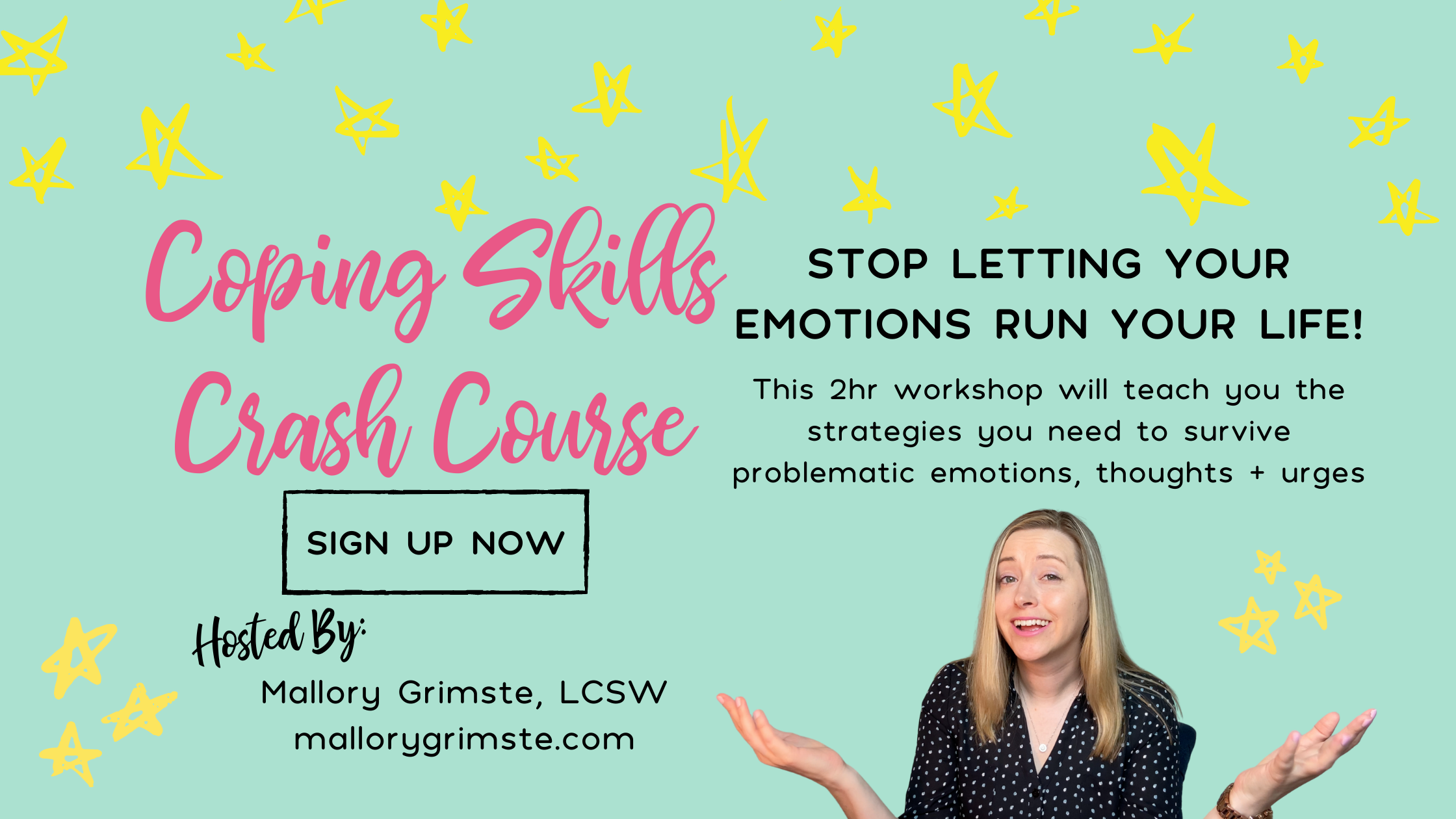I love Dialectical Behavior Therapy but I am not a DBT therapist.
There is a difference between DBT treatment vs DBT-informed therapy. It can be a bit confusing if you're not familiar with what the differences are and why it matters.
After all, isn't DBT just Dialectical Behavior Therapy? Well.... yes and no.
In this video post, I'm explaining why I am not a DBT therapist (I know, confusing right?) and why I've chosen not to pursue certification at this time.
I'm also sharing how I plan to continue using DBT to inform my treatment and therapy with the teens I work with moving forward.
If you prefer to watch the video, click this image here:
🔔Subscribe here for MORE videos that help teens struggling with mental health: mallorygrimste.com/youtube
If you prefer to read, here’s what you need to know about the differences between DBT treatment vs DBT-informed therapy (and why it matters):
So let me back up and explain a little bit. Dialectical Behavior Therapy was developed by psychologist Marsha Linehan, and she created this in response to the fact that there wasn't a lot of good treatment for people who suffered from Borderline Personality Disorder.
People who struggle with Borderline Personality Disorder historically haven't responded well to treatment like Cognitive Behavior Therapy or Psychodynamic treatment. So what Marsha Linehan did is she developed this treatment called Dialectical Behavior Therapy, where she combined aspects of Cognitive Behavior Therapy and some Eastern philosophies, and incorporated them into a four-module program and studied its impact.
What they found is that this program worked especially well for people who were diagnosed with a Borderline Personality Disorder. (YAY!!)
LIKE THIS VIDEO POST? I’D LOVE FOR YOU TO FOLLOW ME ON PINTEREST AND PIN IT FOR LATER!
Since then, we have found that Dialectical Behavior Therapy has been researched and proven over and over again to be a highly effective form of therapy for certain groups of people who traditional therapy didn't always work for.
One of those populations is adolescents or teenagers who have struggled with chronic suicidal ideation, which is one of the reasons that I have studied and learned a lot about Dialectical Behavior Therapy because this is an area that I specialize in.
Comprehensive Dialectical Behavior Therapy programs typically include weekly individual counseling, skills coaching, and group therapy for skills building, which means that you have several therapists and treatment providers that are typically involved on the treatment team. When working with teenagers, there's usually often a multifamily group as well that helps parents and other family members understand and learn these skills too.
Because there are so many aspects of supporting clients in a comprehensive DBT program, there is also what's called DBT team consultation, where the members of that team meet on a regular or semi-regular basis to learn and finesse their skills in this therapy. It's also where they'll discuss any shared cases and what they can learn from each other.
So this is probably gonna make me sound older than I am, but way back when I was a wee social worker and I was learning about Dialectical Behavior Therapy, there was no certification process at that time. There was a lot of self-learning, and going to different trainings, and reading the books, and then talking about them with your treatment team.
Now, I really love Dialectical Behavior Therapy so I went to a LOT of trainings.
*I'm also a little bit of a nerd.
WANT TO REMEMBER THESE TIPS? DON’T FORGET TO PIN IT!
Over time, they have really finessed the programming and now have different certification processes if you'd like to formally be what's called a DBT therapist. And I gotta tell ya, I did look into certification. But when it really came down to it, one of the things that I really like about using Dialectical Behavior Therapy is the breakdown of the skills and the strategies, but I don't really like the format of it.
I'm somebody who likes to personalize my care and treatment to what's happening for the person right now and not having to wait a month for when we're on that module.
So in order to pull from Dialectical Behavior Therapy and utilize these different skills and strategies in my sessions as needed, I've personally decided not to become certified in DBT at this time.
Now that doesn't mean that my clients don't benefit from those interventions. It just means that I can't call myself a DBT therapist because that's not accurate. The therapy that I provide is informed by Dialectical Behavior Therapy treatment but it is not Dialectical Behavior Therapy.
Does that make sense? I know it can get a little confusing but it would be horribly wrong of me to misrepresent the work that I do as something that it isn't.
And usually, if somebody is seeking out DBT therapy specifically, they probably need a more team approach, which is not something that I can offer as one clinician in private practice.
If you're interested in learning more about one of the modules of DBT, I have a wonderful video all about the ultimate guide to DBT coping skills that you can check out right over here: https://youtu.be/WuxjYKk2eOU
If you found the information in this video useful and helpful, please be sure to share it with others because you never know who YOU could be helping. Thanks for watching!
IF YOU ARE CONCERNED THAT YOU, OR SOMEONE YOU KNOW, MAY BE CONSIDERING KILLING THEMSELVES, PLEASE CONNECT THEM WITH HELP.
SUICIDE PREVENTION LIFELINE
1-800-273-8255
✨ Call 24/7 ✨

![VIDEO PIN [04-01-21] DBT treatment vs DBT-informed therapy_ What's the difference and why it matters.png](https://images.squarespace-cdn.com/content/v1/573fc8fb2b8dde2ec23f2c73/1614790918278-89FWL4AH6ZSCH0O5W5Y2/VIDEO+PIN+%5B04-01-21%5D+DBT+treatment+vs+DBT-informed+therapy_+What%27s+the+difference+and+why+it+matters.png)

![TEXT PIN [04-01-21] DBT treatment vs DBT-informed therapy_ What's the difference and why it matters.png](https://images.squarespace-cdn.com/content/v1/573fc8fb2b8dde2ec23f2c73/1614790954815-48U3MKK2TI06D0WWPZLE/TEXT+PIN+%5B04-01-21%5D+DBT+treatment+vs+DBT-informed+therapy_+What%27s+the+difference+and+why+it+matters.png)

